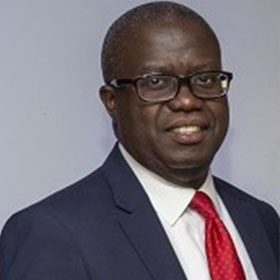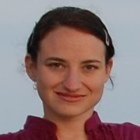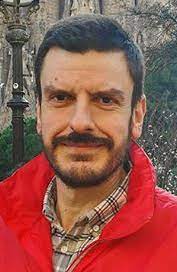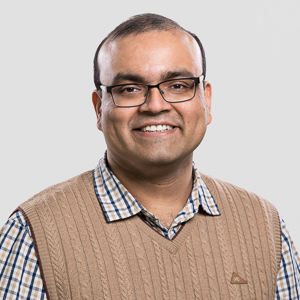Implementing Digital Twins for service and operations - how far have we come?

Gilbert-Owusu
British Telecom, UK
Abstract: Across industries, there is a concerted effort to use AI to derive actionable insight with the objective to improve business and societal value. Good AI models depend on good quality data and incomplete or incorrect data would lead to undesired outcomes. To address this challenge, organisations embark on digital transformation programmes to help them instrument their assets and operations. Digital twins present a significant opportunity to model an organisation's assets, service, and operations. They allow us to visualise, run 'what-if' simulations and scenarios, and provide a digital snapshot of complex systems and processes. Digital twins assist in monitoring and optimising the operation and maintenance of physical assets, systems, and processes, enabling better-informed decision making, leading to improved outcomes in the physical world. This could translate into operational costs reduction and better service for customers. Despite these benefits, the implementation of digital twins for service and operations is not widespread. This keynote explores the challenges that must be addressed for enterprises to realise the benefits of digital twins. In particular, the challenge of improving data quality and modelling physical infrastructure for management, optimisation, and simulation. The keynote draws on industrial case studies and outlines the critical success factors for implementing digital twin for service and operations.
Biography: Dr. Gilbert Owusu is BT's Data & AI Director for Corporate Units and Networks. He has a strong track record in applying AI and operational modelling technologies which have led to significant customer service improvements and OPEX reduction in BT's operations. Gilbert's work on applying AI technologies for transforming service operations have been published widely in book chapters, conferences, and journals. He is the co-editor of two books on service production management, a visiting professor at University of Essex, a member of the UK Operational Research Society's General Council and an executive member of the British Computer Society's Specialist Group on AI.
Catching up on the Internet Computer

Yvonne-Anne Pignolet
DFINITY, Switzerland
Abstract: In May 2021 the internet computer, a web-speed smart contract and app platform, went live. After less than 6 months, the internet computer hosts more than 12'000 smart contract apps and serves more than 100'000 users, providing a plethora of services, ranging from social media and chat applications to DeFi and NFTs. Thanks to its governance system and support for new service and business models, the internet computer has the potential to revolutionize how we develop, host and use apps. Naturally, such a system accrues a vast amount of data as well. In order to provide a reliable service despite some of the machines failing or misbehaving, it is hence crucial to provide efficient mechanisms for machines to (re)-join the system. In this talk I discuss the problems and challenges the Internet Computer faces to enable machines to catch up quickly and present our approach to tackle them.
Biography: Yvonne-Anne Pignolet's work is centered around distributed systems, ranging from the design and analysis of algorithms for reliable and efficient distributed systems despite failures and malicious behaviour to complex network analysis. After her PhD at ETH Zurich in 2009 she was a postdoc at IBM Research Zurich and Ben Gurion University, Be'er Sheva. She worked for 8 years at ABB Corporate Research, Switzerland mostly devoted to research on communication systems for industrial and power systems, as a Principal Scientist in her final role. In 2019, she joined DFINITY, where she leads a team of researchers building and improving the Internet Computer.
Sense (and) the City: From grassroots IoT sensors and city-fostered Open Data to Urban Observatories

Theo Tryfonas
University of Bristol, UK
Abstract: Digitalization and the Internet of Things help cities to improve services, increase productivity and reduce costs. Just as citizens can monitor their heart rate or their blood pressure to understand their fitness levels and identify potential worrying signs, city-scale monitoring of traffic and pollution enables a city to develop insights into low air quality areas and consider improvement measures. As the IoT has become an integral part of life, it provides a platform for the interconnection of everyday objects and the generation of volumes of data. With relatively simple technologies cities and citizens alike are able to sense their environment, e.g., to monitor air quality and pollution in their immediate environment. With caveats about privacy and accuracy, these data sets can complement data that city authorities collect at city scale for validating or improving policies. In this talk, we present examples of sensing capabilities in urban environments from citizen to city scale and discuss the potential role of emerging socio-technical infrastructures such as Urban Observatories (UOs), i.e., independent, open, and transparent entities that facilitate the collection and curation of grassroots data as well as stakeholder engagement. We demonstrate how Urban Observatories can become a conduit for alignment of community- and city-level action by referring to a number of city sensing case studies from the city of Bristol, UK, host of one of the six UK Collaboratorium for Research in Infrastructure and Cities (UKCRIC) UOs.
Biography:
Professor Theo Tryfonas is broadly interested in the Internet of Things (IoT),
systems engineering, and the security of cyber-physical systems. Most of his current work is in the field of smart cities e.g.
urban sensing and energy-efficient deployments of wireless sensor networks, design of secure IoT applications and open data architectures,
location and data privacy in mobility applications, sensor integration with building management systems in smart buildings etc.
In general, his research addresses questions of how emerging technologies can be used to deliver a more sustainable urban future through resource efficiency,
resilience, and operational improvement of infrastructure systems.
He is also interested in applying Systems and cybernetics techniques such as system dynamics and viable system modelling,
network analytics and game theory, for information and risk management in this context.
He views Systems thinking as a fundamental approach for understanding and dealing with complexity,
especially of cities and civic tech.
Finally, he has experience with IT auditing and digital forensics, looking at compliance,
governance and the extraction and analysis of digital evidence, particularly from emerging technologies such as mobile phones,
wireless sensor networks and social media. On these issues,
he has acted in the past as an Expert Witness in a number of court cases.
Terraview OS - Empowering modern vineyard management through Data

Piyush Harsh
CTO, Terraview, Zurich, Switzerland
Abstract:
Climate Change will inevitably transform the way world produces goods. Wine Industry which generated over $380bn this year is already feeling those effects.
Terraview is on a mission to transform the wine industry,
make it climate ready and accelerate the wine sector journey of $1Tn.
TerraviewOS is a global SaaS product, currently used by over 130 wineries in 5 countries.
In this talk, co-founder and Group CTO - Dr Piyush Harsh, will talk about the core technology stack powering TerraviewOS,
highlighting aspects of growth pains, and various industry first, innovative solutions which have been adopted internally to deal with the continuous data processing scale.
Biography:
Dr. Piyush Harsh, an ACM senior member, is the co-founder and group CTO of Terraview,
a technology startup company helping vineyards and wineries globally deal with effects of climate change.
Having 18+ years of experience in computing, Piyush has been deeply involved with research and innovation in virtualization,
cloud computing and distributed systems in general. In the past, Piyush has done extensive work in network and computer security,
network protocol design, privacy preservation using Noam Chomsky mix firewalls, and modern telecommunication sub-systems.
Piyush has led several European teams working in multiple large European Commission funded research consortiums developing solutions for federated cloud systems,
orchestration, datacenter automation, virtualization of telco-stacks and large scale test infrastructures.
Piyush has founded two other companies in the past, providing usage driven accounting and billing solution for large cloud and datacenter operators.
An alumnus of IIT Roorkee and University of Florida, having worked in the United States,
France and Switzerland, with renowned R&D centers such as INRIA, Zurich University of Applied Sciences in the past,
Piyush brings a global perspective in Computer Science research in complex distributed systems.